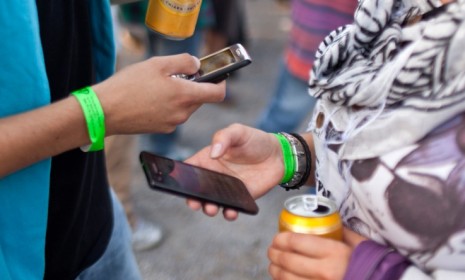How Facebook and Twitter are trumping sex
A new study finds that college kids think perusing social media is better than hooking up — or at least easier

A free daily email with the biggest news stories of the day – and the best features from TheWeek.com
You are now subscribed
Your newsletter sign-up was successful
What could possibly tempt college kids more magnetically than sex, cigarettes, and booze? If a new study from the University of Chicago is to be believed, Facebook. Well, social media generally, says Doug Barry at Jezebel. To be fair, "the urge to have sex is stronger," but "people are more likely to succumb to the urge to float around on the social-media lazy river by checking Twitter and Facebook, the two most alluring internet sirens around." In other words, "social media's seductiveness is, quite simply, more powerful than sex."
I'm not buying it. How did this study work?
Researchers at Chicago's Booth College of Business gave special BlackBerrys to about 250 undergraduates in Germany. For a week, the participants were asked every half-hour to report any craving they'd experienced since the last report, how strong it was (from "strong" to "irresistible"), and whether they gave in. Along with confessions about compulsions to tweet and check Facebook, the subjects weighed in on their desire for sex, tobacco, alcohol, and, oddly enough, work. But the urge that was hardest to resist scratching was the social media itch.
The Week
Escape your echo chamber. Get the facts behind the news, plus analysis from multiple perspectives.

Sign up for The Week's Free Newsletters
From our morning news briefing to a weekly Good News Newsletter, get the best of The Week delivered directly to your inbox.
From our morning news briefing to a weekly Good News Newsletter, get the best of The Week delivered directly to your inbox.
Why?
The study's lead author, Wilhem Hofmann, has two theories: Facebook is more easily satisfied than other urges, and "it feels like it does not cost much to engage in these activities, even though one wants to resist." In other words, says David Lazarus at The Los Angeles Times, "cheap thrills." That's not the full explanation, says Tim Worstall at Forbes. "Sex is a self-limiting activity" — in other words, once you've done the deed, you're usually sated for at least several hours — but "checking Twitter or Facebook is simply not self-limiting in the same manner."
So what's the takeaway here?
Facebook and Twitter are addictive, and plenty of people have a hard time cutting the cord — sadly, the study's participants had a similar relationship to work. But I'm not convinced this proves that today's youth crave social media more than sex, says Forbes' Worstall. I mean, "I do agree that the youth of today are a little different from we were when we were young," but not that different. Look at it this way: We also eat more than we copulate, "but 'mealtimes are more tempting than sex' doesn’t have quite the same ring to it, does it?" Well, fine, "but that doesn't make the urge to tweet or post to Facebook any less strong," says Daniel Terdiman at CNET. The study doesn't conclusively show whether this urge "affects internet junkies' sex lives," but one thing's for sure: "This is just the kind of study that inspires those who are not internet junkies to tell people to get a life."
A free daily email with the biggest news stories of the day – and the best features from TheWeek.com
Sources: AFP, CBS, CNET, Forbes, Jezebel, The Los Angeles Times
-
 The problem with diagnosing profound autism
The problem with diagnosing profound autismThe Explainer Experts are reconsidering the idea of autism as a spectrum, which could impact diagnoses and policy making for the condition
-
 What to know before filing your own taxes for the first time
What to know before filing your own taxes for the first timethe explainer Tackle this financial milestone with confidence
-
 The biggest box office flops of the 21st century
The biggest box office flops of the 21st centuryin depth Unnecessary remakes and turgid, expensive CGI-fests highlight this list of these most notorious box-office losers